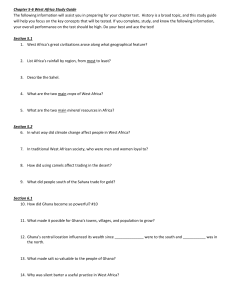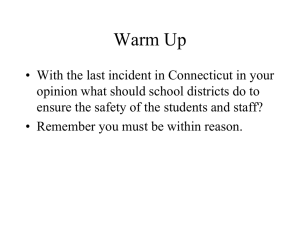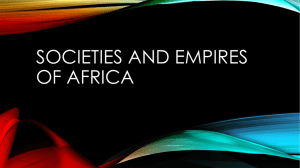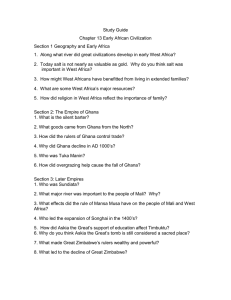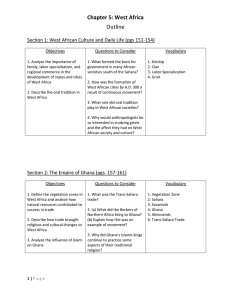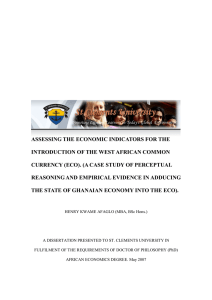Go Africa… Go Germany 2009
advertisement
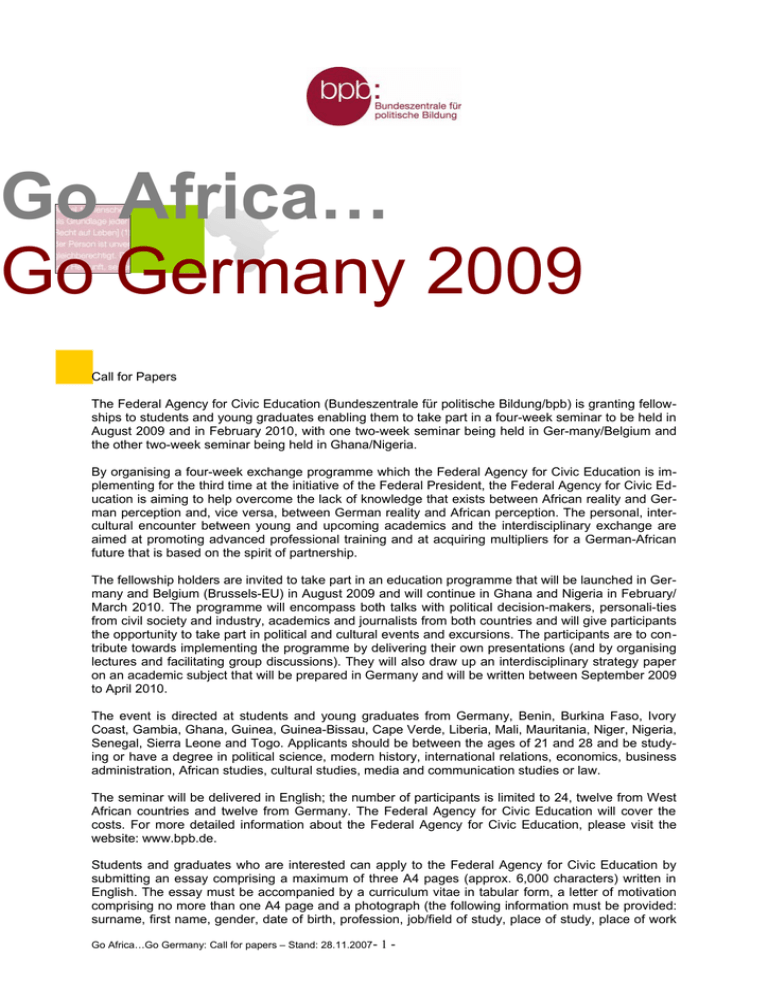
Go Africa… Go Germany 2009 Call for Papers The Federal Agency for Civic Education (Bundeszentrale für politische Bildung/bpb) is granting fellowships to students and young graduates enabling them to take part in a four-week seminar to be held in August 2009 and in February 2010, with one two-week seminar being held in Ger-many/Belgium and the other two-week seminar being held in Ghana/Nigeria. By organising a four-week exchange programme which the Federal Agency for Civic Education is implementing for the third time at the initiative of the Federal President, the Federal Agency for Civic Education is aiming to help overcome the lack of knowledge that exists between African reality and German perception and, vice versa, between German reality and African perception. The personal, intercultural encounter between young and upcoming academics and the interdisciplinary exchange are aimed at promoting advanced professional training and at acquiring multipliers for a German-African future that is based on the spirit of partnership. The fellowship holders are invited to take part in an education programme that will be launched in Germany and Belgium (Brussels-EU) in August 2009 and will continue in Ghana and Nigeria in February/ March 2010. The programme will encompass both talks with political decision-makers, personali-ties from civil society and industry, academics and journalists from both countries and will give participants the opportunity to take part in political and cultural events and excursions. The participants are to contribute towards implementing the programme by delivering their own presentations (and by organising lectures and facilitating group discussions). They will also draw up an interdisciplinary strategy paper on an academic subject that will be prepared in Germany and will be written between September 2009 to April 2010. The event is directed at students and young graduates from Germany, Benin, Burkina Faso, Ivory Coast, Gambia, Ghana, Guinea, Guinea-Bissau, Cape Verde, Liberia, Mali, Mauritania, Niger, Nigeria, Senegal, Sierra Leone and Togo. Applicants should be between the ages of 21 and 28 and be studying or have a degree in political science, modern history, international relations, economics, business administration, African studies, cultural studies, media and communication studies or law. The seminar will be delivered in English; the number of participants is limited to 24, twelve from West African countries and twelve from Germany. The Federal Agency for Civic Education will cover the costs. For more detailed information about the Federal Agency for Civic Education, please visit the website: www.bpb.de. Students and graduates who are interested can apply to the Federal Agency for Civic Education by submitting an essay comprising a maximum of three A4 pages (approx. 6,000 characters) written in English. The essay must be accompanied by a curriculum vitae in tabular form, a letter of motivation comprising no more than one A4 page and a photograph (the following information must be provided: surname, first name, gender, date of birth, profession, job/field of study, place of study, place of work Go Africa…Go Germany: Call for papers – Stand: 28.11.2007 - 1- and place of residence). Applicants must also issue a declaration stating that they wrote the essay themselves without any help from third parties. A further condition for receiving a grant is that applicants must be able to participate for the entire period. Full applications should be emailed to the Federal Agency for Civic Education at: goafrica@bpb.de by 1 March 2009. You may choose any one of the following topics as the topic of your essay: 1. Ghana: Good Governance, NEPAD, democracy In the past few years, Ghana has steadily gained economic growth and been successful in reducing poverty. Even though Ghana has comparatively high per-capita earnings compared to other countries in West Africa, it is heavily dependent on funds from international development cooperation. Measured against Gross Domestic Product (GDP), they account for around one-tenth of GDP and one-third of the national budget. Ghana is considered to be politically stable and was the first country to fully accede to the African Peer Review Mechanism. In response to the Country Report that was published in early 2006, Ghana implemented an action plan in order to effectively counteract the deficits that had been identified (e.g. corruption in the public service). The President of the Federal Republic, Horst Köhler and President John Kufour announced their readiness and determination in recent years at a number of meetings – also within the framework of the Partnership with Africa initiative – to work on a long-term partnership that is beneficial to both sides. At the same time, Ghana is one of the countries German development cooperation focuses on, particularly on the areas of democracy, civil society and public administration. 1. 2. 3. The NEPAD initiative is being viewed with growing criticism – especially against the backdrop of recent events in Zimbabwe. What opportunities does NEPAD actually offer in political, economic and administrative terms? Please discuss this using Ghana as an example. Please identify points of criticism in relation to the implementation of the NEPAD initiative and indicate possible solutions. During the Go Africa...Go Germany 2008 scholarship programme, a Kenyan participant said at a reception hosted by the Federal President: “The people in my country are not overly interested in democratisation, they are more interested in being able to lead a safe and humane life.” Please rate the focal points of German development cooperation against this backdrop. 2. Economy and energy Energy consumption has risen sharply in the countries of West Africa in recent years. Even now, Mali, for instance, is no longer able to safeguard the national power supply with its own power plants (hydropower stations and thermal power stations) even though just 16.7% (2006) of the population has access to electricity which is also very expensive. Even now, power cuts often occur. The demand for electricity rises by between 10% and 13% a year in Mali. Mali and Ivory Coast decided at the begin- ning of the year to combine their electricity grids. On 29 August 2008, the Energy Ministers of the Economic Community Of West African States (ECOWAS) discussed the energy crisis at a meeting in Guinea Bissau and adopted a joint action plan. The construction of an ECOWAS Regional Electricity Regulatory Authority (ERERA) for West Africa was the subject matter of the agreements. It is to be built in cooperation with the United Nations Industrial Development Organization (UNIDO). It is above all a matter of coordinating and harmonising energy policy measures implemented by West African countries and of endeavouring to enhance the efficiency of energy generation in the Member States. The creation of a common body to regulate the West African electricity market is to be a suitable tool for doing so. 1. 80% of the energy sector in Mali is still marked by the use of traditional energy sources (timber and charcoal). By contrast, modern energy sources such as polynuclear aromatic hydrocarbons and electricity are used comparatively rarely – accounting for just 10% of total energy consumption and, renewable energies are hardly used at all. What opportunities does the use of solar energy offer West Go Africa…Go Germany: Call for papers – Stand: 28.11.2007 - 2- Africa? What obstacles have hampered the development and expansion of solar technology in West Africa up to now? 2. The Investment and Development Bank of the Economic Community Of West African States (ECOWAS) and the West African Development Bank (Banque Ouest-Africaine De Developpement) (BOAD) have pledged their support in coping with the energy crisis. What are the potential/actual effects of the international financial crisis on energy projects in West Africa? Please explain your view. 3. The Federal Republic of Germany supports measures aimed at enhancing basic energy supply for households and small companies in the countries of West Africa. Please assess its commitment and indicate desiderata. 4. Abundance of resources in Nigeria Nigeria has rich raw material deposits such as oil and natural gas. According to Energy Information Administration (EIA), Nigeria is the world’s eighth largest oil exporting nation. Oil revenues account for 80% of government revenues. The bulk of oil exports go to the USA (approximately 42%) and Europe (just under 20%). As far back as the 1950s, large international oil companies such as Agip acquired oil production licensing rights in the Niger Delta. Today, Royal Dutch Shell, ExxonMobil, Chevron, ConocoPhilips, Agip and TOTAL, in particular, are actively engaged in oil production in Nigeria. Although oil exports represent a lucrative source of revenue for the country, Nigeria has to import oil for its own needs and the World Bank estimates that around 37% of the population live in poverty. At the same time, oil production is restricted by rebel groups such as MEND (Movement for the Emancipation of the Niger Delta). In order to counter the heavy dependency on oil, the Nigerian government plans, with its National Economic Empowerment and Development Strategy – 2), to promote strategies for energy diversification (e.g. natural gas and bioethanol from sugar cane and manioc) by 2011. The aim is also to achieve greater transparency in relation to oil revenues by applying and implementing the criteria and principles of the Extractive Industries Transparency Initiative (EITI). Please indicate the main causes for the existing contradiction between Nigeria’s persistent poverty and the resource abundance. Please include national and international aspects in your considerations. Explain your views. 2. Regional, ethnic, religious and social differences are seriously hampering the country’s development – e.g. in the Niger Delta and are promoting the emergence of internal conflicts through polarisation, for instance, in respect of the distribution of natural oil revenue. What steps can the Government of the new President Yar’Adua take in order to solve the permanent crisis in the Niger-Delta ? 3. Please assess the Extractive Industries Transparency Initiative. 1. Go Africa…Go Germany: Call for papers – Stand: 28.11.2007 - 3-


